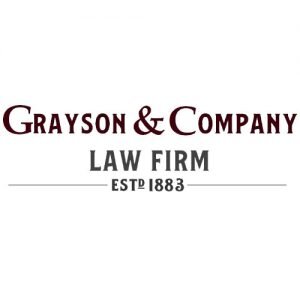Best Natural Resources Lawyers in Moose Jaw
Share your needs with us, get contacted by law firms.
Free. Takes 2 min.
List of the best lawyers in Moose Jaw, Canada
About Natural Resources Law in Moose Jaw, Canada
Natural Resources law in Moose Jaw, Saskatchewan, deals with the rules and regulations that govern the ownership, management, use, and conservation of natural resources such as land, water, minerals, oil and gas, forests, and wildlife. Moose Jaw and the broader province of Saskatchewan have a rich history of agriculture, energy extraction, and environmental stewardship, making natural resources a central part of the local economy and community life. Laws in this field are shaped by federal and provincial statutes, as well as local bylaws, often balancing economic development with environmental sustainability.
Why You May Need a Lawyer
There are several situations where individuals, businesses, or organizations in Moose Jaw may need the help of a lawyer who specializes in natural resources:
- Acquiring, leasing, or selling land for farming, mining, oil and gas, or other resource-based uses.
- Understanding mineral rights and negotiating royalty or extraction agreements.
- Resolving disputes over water rights, land boundaries, or resource access.
- Navigating environmental regulations or responding to alleged violations.
- Dealing with indigenous land claims or consultation processes.
- Seeking permits for development, drilling, or forestry operations.
- Protecting property against environmental damage or legacy contamination.
- Litigating disputes over ownership, easements, or commercial contracts related to natural resource exploitation.
- Representing interests before government tribunals or regulatory agencies.
- Ensuring compliance with sustainability standards and corporate social responsibility requirements.
Local Laws Overview
Natural resources law in Moose Jaw is mainly governed by provincial laws set by the Government of Saskatchewan, but federal acts and local bylaws also apply. Key legal aspects include:
- Land Ownership: Most land in Saskatchewan is privately owned, but mineral rights often remain with the Crown (provincial government). Surface and mineral rights can be separated.
- Mineral and Resource Rights: The The Crown Minerals Act and related regulations control exploration, leasing, and production of resources such as potash, oil, and gas.
- Water Rights: The The Water Security Agency Act regulates water use, including irrigation, industrial use, and domestic supply.
- Environmental Protection: The Environmental Management and Protection Act establishes standards for activities that may affect the environment, such as waste disposal, chemical use, and land reclamation.
- Wildlife and Forestry: Activities affecting forests, fish, and wildlife are regulated to balance resource use with conservation goals.
- Indigenous Consultation: The provincial government has a duty to consult and accommodate First Nations and Métis groups when projects may affect their traditional territories or treaty rights.
- Local Bylaws: Moose Jaw enforces additional land use, zoning, and environmental bylaws that may affect natural resource projects within city limits.
Frequently Asked Questions
What are mineral rights, and how do they differ from surface rights?
Mineral rights pertain to the ownership and entitlement to extract underground resources (like oil, gas, or minerals), while surface rights involve the use and occupation of the land itself. In Saskatchewan, it is common for these rights to be owned separately, with the Crown retaining mineral rights in many cases.
How can I find out who owns the mineral rights on my property?
You can check mineral rights ownership through the provincial land titles registry or consult with a natural resources lawyer, who can obtain and interpret land title documents and mineral registry records for you.
Do I need a permit to drill a water well on my land?
Yes, most water wells require a permit from the Water Security Agency, especially for agricultural or industrial use, to ensure sustainable water management and protect aquifers from overuse or contamination.
What should I do if I discover oil or minerals on my land?
Before any exploration or extraction, consult a lawyer to confirm your rights. Depending on ownership, you may need agreements with the Crown or private mineral right holders and will require permits and regulatory compliance.
What regulations apply to farming near rivers or wetlands?
Development or activity near water bodies is regulated to prevent pollution or habitat destruction. Setback distances, restrictions on chemical use, and habitat protection rules often apply under both provincial laws and environmental regulations.
How does the law protect Indigenous rights regarding natural resources?
The provincial and federal governments must consult and accommodate Indigenous groups if projects might affect treaty or traditional rights. Agreements may address access, benefit sharing, or environmental protection.
Who regulates oil and gas development in Moose Jaw?
The Ministry of Energy and Resources (Saskatchewan) regulates exploration, licensing, production, and site reclamation, setting safety and environmental standards for projects in the region.
Can I oppose a natural resource project planned near my property?
Yes, you can raise concerns through public consultation processes, environmental assessments, and appeals. A lawyer can help you navigate hearings or submissions to the relevant authorities.
What should I do if I receive a notice of environmental violation?
Consult a lawyer right away. Responding properly can protect your rights and interests and may help negotiate compliance measures, appeals, or mitigation plans.
How can a lawyer assist with natural resources contracts or disputes?
A lawyer can negotiate and draft contracts, interpret regulatory requirements, represent you in disputes, and ensure you meet your legal obligations while protecting your business interests and property rights.
Additional Resources
For more information or to access assistance, consider these resources:
- Ministry of Energy and Resources (Saskatchewan): Oversees petroleum, mining, and resource matters.
- Water Security Agency: Responsible for water management, licensing, and regulation in Saskatchewan.
- Saskatchewan Ministry of Environment: Handles environmental regulation, conservation, and development approvals.
- City of Moose Jaw: Provides zoning, land use, and municipal bylaw information.
- Law Society of Saskatchewan: Offers a directory of practicing lawyers and guidance on choosing legal counsel.
- Indigenous organizations: Contact local First Nation or Métis offices for guidance on Indigenous rights and consultations.
Next Steps
If you need legal assistance with a natural resources issue in Moose Jaw, follow these steps:
- Gather all available documents related to your issue, such as land titles, mineral agreements, permits, or notices from authorities.
- Write down a summary of events, key dates, and the main questions or concerns you have.
- Contact a lawyer who practices in the field of natural resources or environmental law. You can search the Law Society of Saskatchewan directory for local options.
- Request an initial consultation to discuss your situation confidentially and obtain preliminary advice.
- Ask your lawyer about fees, timelines, and your options for moving forward, whether it’s negotiation, regulatory application, or dispute resolution.
- Use resources from provincial agencies, the City of Moose Jaw, and any relevant industry or Indigenous organizations for additional information and support as needed.
By taking these steps, you can protect your interests, understand your rights and responsibilities, and work towards a positive outcome in your natural resources matter.
Lawzana helps you find the best lawyers and law firms in Moose Jaw through a curated and pre-screened list of qualified legal professionals. Our platform offers rankings and detailed profiles of attorneys and law firms, allowing you to compare based on practice areas, including Natural Resources, experience, and client feedback.
Each profile includes a description of the firm's areas of practice, client reviews, team members and partners, year of establishment, spoken languages, office locations, contact information, social media presence, and any published articles or resources. Most firms on our platform speak English and are experienced in both local and international legal matters.
Get a quote from top-rated law firms in Moose Jaw, Canada — quickly, securely, and without unnecessary hassle.
Disclaimer:
The information provided on this page is for general informational purposes only and does not constitute legal advice. While we strive to ensure the accuracy and relevance of the content, legal information may change over time, and interpretations of the law can vary. You should always consult with a qualified legal professional for advice specific to your situation.
We disclaim all liability for actions taken or not taken based on the content of this page. If you believe any information is incorrect or outdated, please contact us, and we will review and update it where appropriate.










